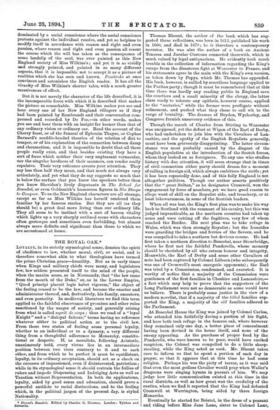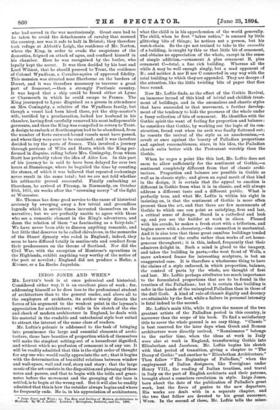THE ROYAL OAK.*
LOYALTY, in its strictly etymological sense, denotes the spirit of obedience to law, whether moral, civil, or social, and is therefore somewhat akin to what theologians have termed the prime Christian grace—humility. But as in early times when Kings and military chiefs were many, and legislators few, law seldom presented itself to the mind of the people, when the maxim arose, as in Normandy, that "the law came from the mouth of the Duke," or, as in the Lower Empire, " Quod principi placuit legis habet vigorem," the object of the feeling ceased to be the law, and became the enactor and administrator thereof, and, derivatively, his family, ancestors, and even posterity. In medieval literature we find this term applied to the faithful observance of promises and other rules sanctioned by the usages of society, and generally arising from what is called esprit de corps; thus we read of a "loyal Knight" and a "disloyal faitour," terms having no reference whatever either to political action or to the civil law. From these two states of feeling arose personal loyalty, whether to an individual or to a dynasty, a very different thing from a thoughtful adherence to Monarchy, constitu- tional or despotic. If, as moralists, following Aristotle, unanimously hold, every virtue lies in an intermediate position between two vices contrary to it and to each other, and from which to be perfect it must be equidistant, loyalty, in its ordinary acceptation, should act as a check on the excesses of impassioned, even if disinterested, patriotism; while in its etymological sense it should restrain the follies of rulers and impede Dispensing and Indulging Acts as well as Taxation without Representation. In both its applications, loyalty, aided by good sense and education, should prove a powerful antidote to racial distinctions, and to the feeling which, in the political jargon of the present day, is styled Nationality.
• Bleunt's BoscobeL Edited by Charles G. Thomas. London: Tylston and Edwards.
Thomas Blount, the author of the book which has sug- gested these reflections, was born in 1613, published his work in 1660, and died in 1679; he is therefore a contemporary narrator. He was also the author of a book on Ancient Tenures and Jocular Customs connected therewith, which is ranch valued by legal antiquarians. He evidently took much trouble in the collection of information regarding the King's escape from the disastrous fight at Worcester to France, and his statements agree in the main with the King's own version, as taken down by Pepys, which Mr. Thomas has appended. His book, however, is sullied by scurrilous language applied to the Puritan party; though it must be remembered that at this time there was hardly any reading public in England save the courtiers and a small minority of the clergy, the latter class ready to tolerate any epithets, however coarse, applied to the "sectaries," while the former were profligate without refinement, and pushed what they chose to call wit to the verge of brutality. The dramas of Dryden, Wycherley, and Congreve furnish unsavoury evidence of this.
Though the march of Charles from Stirling to Worcester was unop'posed, yet the defeat at Wigan of the Earl of Derby, who had undertaken to join him with the Cavaliers of Lan- cashire, and the apathy of the English Royalists generally, must have been grievously disappointing. The latter circum- stance was most probably caused by the disgust of the English population at the introduction of the Scotch forces, whom they looked on as foreigners. To any one who studies history with due attention, it will seem strange that in times of civil commotion either party should dream for a moment of calling in foreign aid, which always embitters the strife ; yet it has been repeatedly done, and of this folly England is not altogether guiltless. Though our author asserts positively that the" great Sultan," as he designates Cromwell, won the engagement by force of numbers, yet we have good reason to allege want of skill on the Royalist side, and treachery, or at least lukewarmness, in some of the Scottish leaders.
When all was lost, the King's first plan was to make his way back to Scotland with the remnant of his cavalry, but this was judged impracticable, as the northern counties had taken up- arms and were cutting off the fugitives, very few of whom reached the Border. His next plan was to take refuge in Wales, which was then strongly Royalist; but the Ironsides were guarding the bridges and ferries of the Severn, and he was compelled to take a southern but devious course. He had first taken a northern direction to Boscobel, near Stourbridge, where he first met the faithful Penderells, whose memory should be cherished by all who esteem honour and integrity. Meanwhile, the Earl of Derby and some other Cavaliers of note had been captured by Colonel Lilbuni (who subsequently was one of Cromwell's most energetic opponents) ; the Earl was tried by a Commission, condemned, and executed. It is worthy of notice that a majority of the Commission were gentlemen of the first families in Cheshire and Lancashire,— a fact which may help to prove that the supporters of the Long Parliament were not so democratic as some would have us believe. There is probably some justice in the view of a modern novelist, that if a majority of the titled families sup- ported the King, a majority of the old families adhered to the Parliament.
At Boscobel House the King was joined by Colonel Carlos, who attended him faithfully during a portion of his flight, and here both took refuge in the famous oak, where however they remained only one day, a better place of concealment having been devised in the house itself, and none of the enemy appearing. As the purchase of proper food by the Penderells, who were known to be poor, would have excited suspicion, the Colonel was compelled to do a little sheep- stealing, while the King acted as cook. Mr. Blount takes care to inform us that he spent a portion of each day in prayer, so that it appears that at this time he had some religion. Perhaps his was the piety of terror, as it was said that even the most godless Cavalier would pray when Waller's dragoons were singing hymns in pursuit of him. We may judge how little communication existed at this time in the rural districts, as well as how great was the credulity of the rustics, when we find it reported that the King had defeated Cromwell at Warrington, being aided by three foreign Monarchs.
Eventually he started for Bristol, in the dress of a peasant and riding before Miss Jane Lane, sister to Colonel Lane, who had served in the war meritoriously. Great care had to be taken to avoid the detachments of cavalry that scoured the country, nor was it safe to halt in Bristol ; they therefore took refuge at Abbott's Leigh, the residence of Mr. Norton, where the King, in order to evade the suspicions of the domestics, feigned an attack of ague, and confined himself in his chamber. Here he was recognised by the butler, who loyally kept the secret. It was then decided by his host and Lord Wilmot, that he should proceed to Trent, the residence of Colonel Wyndham, a Cavalier-squire of approved fidelity. This mansion was situated near Sherborne on the borders of Dorset, and it was therefore necessary to traverse a great part of Somerset,—then a strongly Puritanic country. It was hoped that a ship could be found either at Lyme or Charmouth in which he could escape to France. The King journeyed to Lyme disguised as a groom in attendance on Mrs. Coningsby, a relative of the Wyndham family, but though a vessel had been hired there, yet the ship-master's wife, terrified by a proclamation, locked her husband in his chamber, having first carefully removed his most indispensable garments, and thus the King was compelled to return to Trent. A design to embark at Southampton had to be abando. ned, from the number of forts outward-bound vessels must have passed, and where they were sure to be examined; and it was therefore decided to try the ports of Sussex. This involved a journey -through portions of Wilts and Hants, which the King per- formed in disguise, riding before Mrs. Coningsby, from whom Scott has probably taken the idea of Alice Lee. In this part of his journey he is said to have been delayed for over two hours at Stonehenge, where he beguiled the time by counting the stones, of which it was believed that repeated reckonings never result in the same total ; but we are not told whether his arithmetic proved successful. Finally embarking at Shoreham, he arrived at Fecamp, in Normandy, on October 16th, 1651, six weeks after the "crowning mercy" of the fight at Worcester.
Mr. Thomas has done good service to the cause of historical accuracy by sweeping away a few trivial and groundless legends which in servile times incrusted themselves on the narrative; but we are perfectly unable to agree with those who see a romantic element in the King's adventures, and deem the relation of them "as fascinating as a fairy-tale." We have never been able to discern anything romantic, and but little that deserves to be called chivalrous, in the monarchs -of the Stuart dynasty who ruled in England; indeed, they seem to have differed totally in sentiments and conduct from their predecessors on the throne of Scotland. Nor did the Civil War, with the exception of Montrose's operations in the Highlands, exhibit anything very worthy of the notice of the poet or novelist ; England did not produce a Hofer, a ICorner, or a La Roche Jaquelein.



































 Previous page
Previous page